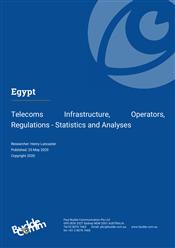Egypt - Telecoms Infrastructure, Operators, Regulations - Statistics and Analyses

Last updated: 20 May 2020 Update History
Report Status: Archived
Report Pages: 59
Analyst: Henry Lancaster
Synopsis
Supported by a population of about 95 million, Egypt has one of the largest telecom markets in North Africa. There is effective competition in most sectors, and this has been supported by the recent award of unified licences to allow operators to offer fixed-line as well as mobile services. The incumbent telco Telecom Egypt secured one of the licenses in August 2016 and launched mobile services in the following year. The three mobile network operators initially failed to bid for the remaining three licenses, which would have enabled them to enter the fixed-line market and provide fully convergent service offerings. This prompted the government to consider opening the bidding process to international operators, but shortly afterwards the three secured licences, being assigned spectrum in June 2017.
The country’s political crisis following the ‘Arab Spring’ revolution which began in 2011 adversely affected the telecom sector. Although revenue has remained stable, capital expenditure has been under pressure and profit margins have fallen due to a weaker local currency and inflation. International investors have also shown considerable caution in response to political uncertainties.
The government in recent months has endeavoured to secure billions of dollars in funding to roll out next-generation networks, develop technology parks and extend broadband availability. In terms of investment, and in smart infrastructure developments, the government’s ambitions to develop a new capital city east of Cairo promises to be a catalyst for an intensification in the deployment of 5G and fibre networks in coming years.
Egypt is well connected by several international submarine fibre optic cables, while it also has an extensive national fibre backbone and some of Africa’s most vibrant FttP deployments.
Key developments:
- Government planning to replace 95% of copper infrastructure with fibre by 2020;
- Work begins on planning a EGP40 billion telecom infrastructure for the proposed new capital city;
- Telecom Egypt and Liquid Telecom agree to expedite the roll out of fibre networks across North Africa;
- Orange Egypt, Vodafone, Telecom Egypt sign $2 billion infrastructure sharing deal;
- SEA-ME-WE 5 cable comes online to add additional international internet capacity;
- Report update includes the regulator’s market data to June 2019, telcos’ operating and financial data to Q2 2019, Telecom Maturity Index charts and analyses, recent market developments.
Companies mentioned in this report:
Telecom Egypt, Orascom Telecom, Menatel, NilePhone, Raya Telecom, Zhone Technologies
Related Reports
- Africa - Fixed Broadband Market - Statistics and Analyses
- Egypt - Telecoms, Mobile and Broadband - Statistics and Analyses
- 2019 Africa - Mobile Network Operators and MVNOs
- Ethiopia - Telecoms, Mobile and Broadband - Statistics and Analyses
- Morocco - Telecoms, Mobile and Broadband - Statistics and Analyses
- Namibia - Telecoms, Mobile and Broadband - Statistics and Analyses
- Madagascar - Telecoms, Mobile and Broadband - Statistics and Analyses
- Benin - Telecoms, Mobile and Broadband - Statistics and Analyses
- Cameroon - Telecoms, Mobile and Broadband - Statistics and Analyses
- Eritrea - Telecoms, Mobile and Broadband - Statistics and Analyses
Share this Report
TMT Intelligence
A platform to scale your intelligence tasks
Monitor critical insights with our AI-powered Market Intelligence Platform gathering and analyzing intelligence in real time. With AI trained to spot emerging trends and detect new strategic opportunities, our clients use TMT Intelligence to accelerate their growth.
If you want to know more about it, please see:
Research Methodology
BuddeComm's strategic business reports contain a combination of both primary and secondary research statistics, analyses written by our senior analysts supported by a network of experts, industry contacts and researchers from around the world as well as our own scenario forecasts.
For more details, please see:
More than 4,000 customers from 140 countries utilise BuddeComm Research
Are you interested in BuddeComm's Custom Research Service?
Hot Topics
News & Views
Have the latest telecommunications industry news delivered to your inbox by subscribing to BuddeComm's weekly newsletter.